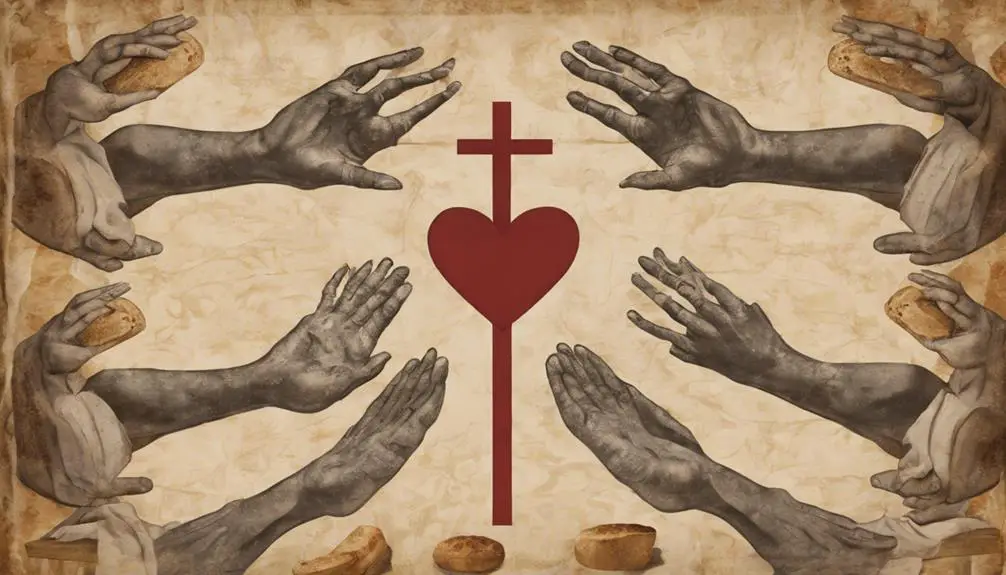Awaken your spiritual understanding with the captivating symbolism of body parts in the Bible; a fascinating journey awaits.

Symbolism of Body Parts in the Bible
Just as a painter uses vibrant colors to bring a canvas to life, the Bible employs symbolic representation of body parts to impart profound spiritual lessons. Have you ever considered, for instance, why hands are often associated with power and authority, or why feet symbolize one's walk of life?
The imagery of the heart, eye, and tongue, each hold their distinct connotations, providing insightful perspectives on human characteristics and behaviors. This hidden layer of biblical interpretation surely piques curiosity, inviting us to explore deeper into this fascinating realm.
Key Takeaways
- Body parts like hands, feet, heart, and tongue carry significant symbolic meanings in biblical narratives and teachings.
- The hand, representing God's power and authority, plays a crucial role in divine intervention and blessings.
- Feet, eyes, and hearts are metaphors for spiritual journeys, discernment of divine truth, and core human spirituality, respectively.
- The symbolic power of the tongue in the Bible highlights the potential of words to bless, curse, enlighten, or deceive.
The Spiritual Significance of the 'Hand

Delving into the spiritual significance of the 'hand' in biblical context, you'll find that it often symbolizes power, authority, and purpose. This symbolism isn't a random selection but an intentional metaphor used to communicate complex ideas in a relatable manner. 'Hand' gestures, for instance, are frequently employed in the Bible to represent the divine intervention or control of God.
In Exodus 7:5, the 'outstretched hand' of God signifies His power over Egypt, indicating an active, purposeful intervention. Similarly, in Isaiah 41:10, the 'right hand' of God is referenced, symbolizing the power and authority of God's support and guidance. This 'right hand' symbolism is a recurring theme in the Bible, particularly in the Psalms, underscoring God's reliability and strength.
The 'laying on of hands', another powerful hand gesture, signifies the transfer of authority or blessing, as seen in Numbers 27:18-23. In the New Testament, it was also used to confer the Holy Spirit or to heal.
Thus, the 'hand' in biblical context isn't merely a physical part but a potent symbol of power, authority, and divine intervention. Its usage underscores the interplay between the human and the divine, the tangible and the intangible.
Feet' as Biblical Metaphors

Transitioning to the metaphorical use of 'feet' in the Bible, you'll discover an intriguing tapestry of symbolism linked to journey, humility, and submission. This symbolism is most evident in the ancient 'Feet Washing Rituals.' Often, these rituals were a demonstration of servitude, a humble act of cleanliness before entering a holy place or participating in a sacred event.
The act of washing another's feet is an expression of humility and submission, a recognition of one's lowliness before the divine. It's symbolic of purification, removing the dust and grime of the world before stepping onto sacred ground. This is beautifully exemplified in the New Testament, when Jesus washes the feet of his disciples, a clear sign of both humility and service.
Moreover, 'feet' are often associated with the 'Walking Pathways Symbolism'. Symbolically, your feet carry you on your spiritual journey. They're the body parts that make contact with the earth, grounding you in your faith. They move you forward, guiding you along the path that has been laid out for you. Thus, in the Bible, 'feet' become a symbol of the journey towards spiritual enlightenment and submission to divine will.
Heart' Symbolism in the Bible

Shifting our focus from the grounded symbolism of feet, we now turn our attention to the 'heart', a deeply significant metaphor in biblical scripture. In the Bible, the heart isn't just a physical organ; it's the core of human emotions, the seat of morality, and the essence of one's spiritual life.
- The 'Heart's Purity': The Bible uses heart symbolism to emphasize purity. Your heart's purity reflects your innermost thoughts, intentions, and motivations. It's not about outward appearances but inner sanctity (Matthew 5:8).
- 'Divine Love': The heart is also a vessel for Divine Love. God's love is poured into your heart, transforming you into an embodiment of His love (Romans 5:5).
- Heart and Obedience: The obedient heart listens and responds to God's commandments (Psalm 119:34).
- Heart and Wisdom: A wise heart seeks knowledge and understanding (Proverbs 18:15).
The 'Eye' as a Symbol of Perception

In the rich tapestry of biblical symbolism, the 'eye' emerges as a potent symbol of perception, illuminating the way we perceive, interpret, and understand the world around us. This concept isn't merely physical, but deeply spiritual, echoing the Divine Vision Interpretation, a profound understanding of divine wisdom and knowledge.
The 'eye' represents our ability to discern truth from falsehood, righteousness from unrighteousness. It's a conduit for the Spiritual Perception Analysis, wherein we interpret the divine messages and seek spiritual enlightenment. In the biblical context, a 'healthy eye' signifies clarity of perception, a pure heart, and an upright character. Conversely, a 'bad eye' often denotes spiritual blindness, a heart hardened against divine truth.
The 'eye' also symbolizes the openness to divine guidance. It's through the 'eye' of understanding that we're able to perceive divine revelations and comprehend spiritual truths. It's the instrument by which we recognize God's omnipresence and omnipotence, enabling us to see God's hand in all things. By studying the symbolism of the 'eye' in the Bible, you'll gain a deeper understanding of spiritual perception and divine wisdom.
Unraveling the Symbolism of the 'Tongue

Delving into the biblical symbolism of the 'tongue', you'll discover it's a powerful metaphor for human communication and the influence of spoken words. The 'tongue', in essence, symbolizes the Tongue's Power to wield both life and death, blessing and cursing. This embodied duality is a recurring theme in biblical literature.
- Power of Blessing: The tongue has the power to bless, to declare prophetic utterances that can guide, encourage, and uplift. It's the tool by which prophets of old spoke God's promises into existence.
- Power of Cursing: Conversely, the tongue can curse, spewing venomous words that inflict emotional and psychological harm.
- Power of Truth: The tongue's power also lies in its ability to propagate truth, providing wisdom and discernment.
- Power of Deception: Conversely, it can also disseminate falsehoods and deceptive speech.
Thus, the 'tongue' signifies the profound impact of our spoken words. It's a poignant reminder that we carry within us the power to build or destroy, bless or curse, enlighten or deceive. As you navigate your own communication, remember the prophetic utterances that your tongue, your words, have the potential to become.
Frequently Asked Questions
How Is the 'Ear' Symbolically Represented in the Bible?
In the Bible, the 'ear' symbolizes wisdom and the act of listening faithfully. It's not just about hearing, it's about understanding and discerning truth.
You'll find references where the 'ear' is used to convey the importance of wisdom and obedience to God's word. So, when you read about the 'ear', think about it as a call to listen with intent and respond with wisdom.
What Does the 'Nose' Signify in Biblical Symbolism?
In biblical symbolism, your nose, often linked with 'nose in prophecy,' signifies discernment. It's about sniffing out truth, distinguishing between good and evil.
You'll find this symbol used to represent God's judgment or wrath in certain contexts. So, the nose isn't just a physical feature, but a metaphor for spiritual perception and divine judgment, adding a deeper layer to biblical narratives.
Are There Any Symbolic Representations of the 'Hair' in the Bible?
Yes, there are notable symbolic representations of hair in the Bible. Hair growth symbolism often signifies strength and devotion to God. A prime example is Samson, whose hair was the source of his supernatural strength.
His long hair represented his dedication to God, and when it was cut, he lost his power. In this context, hair serves as a metaphor for spiritual strength and commitment.
How Is the 'Mouth' Used as a Metaphor in Biblical Scriptures?
In biblical scriptures, the 'mouth' often symbolizes divine speech. It's not just about physical speech, but the metaphoric connotations of the mouth. You'll find it linked to wisdom, prophecy, and divine commands.
For instance, God's words in Isaiah 55:11, 'so is my word that goes out from my mouth,' emphasize the power and purpose behind divine utterances.
It's a fascinating study, seeing how a simple body part can carry such profound symbolism.
Can You Explain the Spiritual Significance of the 'Spine' in the Bible?
You're asking about the spine's strength significance in biblical texts.
Spine or backbone isn't directly mentioned in the Bible, but its symbolic interpretation could be drawn from verses emphasizing strength and support.
It aligns with the notion of standing firm in faith and moral integrity.
This biblical backbone interpretation can offer insightful connotations about spiritual resilience and steadfastness in the face of adversities.
Conclusion
In conclusion, the Bible uses body parts as profound metaphors to express spiritual truths. Hands symbolize action and responsibility, feet represent the path of life, while the heart embodies emotions and will.
The eye portrays perception and discernment, and the tongue stands for the power of speech. Recognizing these symbolic meanings can offer you deeper insights into biblical narratives, enriching your understanding and appreciation of this sacred text.



Sign up